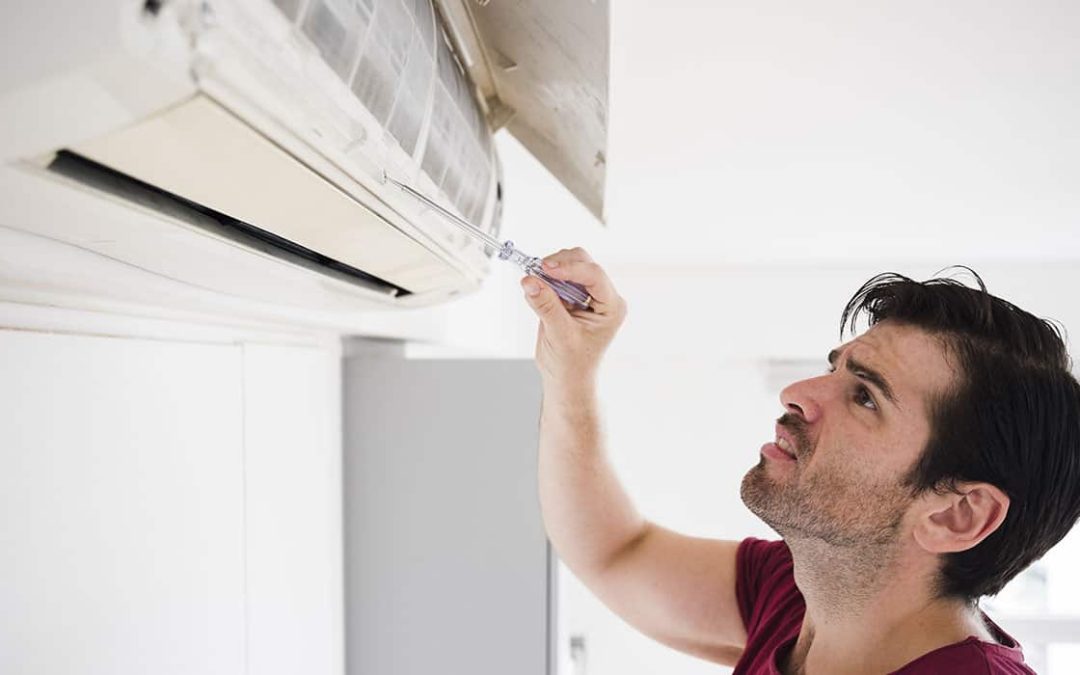Compressor Not Turning On:
The compressor may be unable to get power due to power supply issues like a blown fuse or a tripped circuit breaker. Should the breaker continue to trip, there can be a deeper electrical problem. Another typical reason is a faulty capacitor, responsible for supplying the first electrical shock that starts the compressor. The compressor won’t run if it’s broken. If the thermostat is not giving the right signals, it may also cause the compressor not to start.
Before attempting to diagnose these problems, make sure your circuit breaker hasn’t tripped. If so, try resetting it and seeing if the compressor turns on. If you hear a clicking sound when the air conditioner tries to start, it means that there are electrical or capacitor issues preventing the compressor from starting even though it is receiving signals. Ascertain that the “cool” setting on your thermostat is accurate, and test its operation by modifying the temperature settings.
Overheating Compressor:
Heat is retained within the unit when dirt, debris, or dust clogs the condenser coils, forcing the compressor to operate harder and overheat. Additionally, low refrigerant levels cause the compressor to operate too hard, which can cause overheating and even burnout. Refrigerant leaks can make this problem worse by straining the system further.
Examine the vents for warm air or keep an eye out for any sudden air conditioner shut-offs to identify overheating. When the external device feels very hot to the touch, that’s another telltale symptom. This issue can be avoided by routinely cleaning the condenser coils and making sure there is enough airflow surrounding the outdoor unit. It’s critical to contact a qualified 24-hour AC company expert to check for leakage and recharge the refrigerant if you detect low refrigerant levels.
Strange Sounds Emitting from the Compressor:
A compressor that is operating efficiently should produce the least amount of noise. Unusual noises from the compressor, such as pounding, rattling, hissing, or screeching, indicate that something is off. These sounds may be the result of refrigerant problems, internal mechanical failures, or loose parts.
A loud noise, such as pounding or rattling, could mean that a portion of the compressor has loosened or worn out and has to be fixed right away. Hissing noises are frequently indicative of refrigerant leaks, which should be fixed right once to stop additional harm to the compressor. A professional inspection by a 24-hour ac repair service is recommended in case of a dangerous high internal pressure within the compressor, indicated by a high-pitched screeching noise. While your air conditioner is operating, pay close attention to the sounds it makes. To stop additional damage, turn off the system and contact an 18-hour AC service if you hear any of these strange noises.
Short Cycling of Compressors:
A short cooling cycle is when the compressor of the air conditioner abruptly switches on and off. This not only lowers the system’s efficiency but also puts a lot of strain on the compressor, increasing the likelihood of an early failure. Airflow restriction caused by unclean air filters, malfunctioning thermostats, and refrigerant leaks are common causes of short cycling.
The system may cycle more often than necessary if your thermostat has trouble accurately monitoring temperatures. Because the system is unable to maintain adequate pressure, refrigerant leaks might also result in the compressor’s short cycling. When there is insufficient airflow because of blocked vents or clogged filters, the compressor has to work harder and shut down earlier.
Examine how frequently your air conditioner goes on and off to identify occurrences of brief cycling. There is a problem if the system cycles every few minutes rather than going through a full cooling cycle. Have the best AC repair technician replace any filthy air filters, make sure the thermostat is operating properly, and look for any refrigerant leaks or obstructions in the airflow of the outdoor unit.
Compressor Refrigerant Issues:
Because it draws heat from your interior space and releases it outdoors, refrigerant is necessary for the compressor to function. The compressor must work longer to pump out the remaining refrigerant when the levels are inadequate or there is a leak, which could cause strain and damage.
Leaks are a common source of low refrigerant levels, but they can be hard to find on your own without expert assistance. On the other hand, low cooling efficiency, warm air escaping from vents, and ice accumulation on the evaporator coils are some indicators of refrigerant problems. Low refrigerant levels in your air conditioner over time will lead to the compressor overheating and failing.
Keep an eye on your system’s cooling performance to identify refrigerant problems. There can be a refrigerant leak if you observe that the air conditioner is not cooling as well or is blowing warm air. A typical indicator of low refrigerant levels is ice development, so keep an eye out for it on the exterior unit or around the evaporator coils. Get in touch with an expert for AC leak repair and top off the refrigerant if any of these symptoms manifest.
Electrical Issues:
The performance of the compressor may also be impacted by electrical problems. Damaged capacitors, corroded electrical connections, or faulty wiring can all lead to compressor malfunctions or prevent it from starting. If electrical issues are not fixed right away, the compressor may overheat, short cycle, or possibly fail.
Examine the connections and wiring surrounding the compressor and control panel as a starting point for identifying electrical issues. Repairs are necessary if there is obvious evidence of wear or corrosion. Furthermore, frequent power surges from your air conditioner may indicate a problem with the electrical system. It is recommended in these situations to have an emergency aircon repair technician examine and fix the electrical components.


